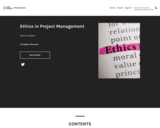
This module is an introduction to the ethical considerations of project management.
- Subject:
- Arts and Humanities
- Business and Communication
- Philosophy
- Material Type:
- Module
- Provider:
- eCampusOntario
- Author:
- Denise Grafton
- Date Added:
- 08/25/2021

This module is an introduction to the ethical considerations of project management.

This seminar is made possible through a collaboration between Radius and the Philosophy section of MIT. This course provides an opportunity to explore a wide range of ethical issues through guided discussions that are geared to equip students for ongoing reflection and action. Lectures and discussions with guest faculty, as well as attendance at on-and off-campus events, expose students to ethical problems and resources for addressing them. The course also encourages students to work collaboratively as they clarify their personal and vocational principles.
Topics vary each term and reflect the interests of those enrolled.

This course introduces the tools of philosophical ethics through application to contemporary issues concerning technology. It takes up current debates on topics such as privacy and surveillance, algorithmic bias, the promise and peril of artificial intelligence, automation and the future of work, and threats to democracy in the digital age from the perspective of users, practitioners, and regulatory/governing bodies.

This course is designed to provide students with a broad overview of the major theories on the relationship between ethnicity and politics. The course is divided into three sections. The first covers general theory and discusses the social construction of ethnicity as well as the limits of construction. The second section discusses ethnicity as a dependent variable. This section studies the forces that shape the development of ethnic identities and their motivating power. The third section addresses ethnicity as an independent variable. In other words, it focuses on how ethnicity operates to affect important political and economic outcomes.
This course is the first semester of a year-long sequence on ethnic politics. However, each semester is self-contained and students may take the course in either or both semesters. Ethnic Politics I aims for breadth over depth. It covers many works in the “canon” of texts on ethnic politics as well as addressing many major topics (modernization, entrepreneurship, prejudice, ethnic party formation, etc.) in one week sessions. Ethnic Politics II covers some of these topics in greater depth and also requires a major research paper.

Discerning the ethnic and racial dimensions of politics is considered by some indispensable to understanding contemporary world politics. This course seeks to answer fundamental questions about racial and ethnic politics. To begin, what are the bases of ethnic and racial identities? What accounts for political mobilization based upon such identities? What are the political claims and goals of such mobilization and is conflict between groups and/or with government forces inevitable? How do ethnic and racial identities intersect with other identities, such as gender and class, which are themselves the sources of social, political, and economic cleavages? Finally, how are domestic ethnic/racial politics connected to international human rights? To answer these questions, the course begins with an introduction to dominant theoretical approaches to racial and ethnic identity. The course then considers these approaches in light of current events in Africa, Asia, Latin America, Europe, and the United States.
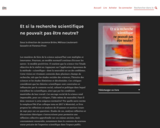
Short Description:
Les manières de faire de la science aujourd’hui sont multiples et innovantes. Pourtant, un modèle normatif continue d’écraser les autres : le modèle positiviste. Il soutient que la science vise l’étude objective de la réalité en s’appuyant sur l’application rigoureuse de la méthode « scientifique » dont la neutralité est un des emblèmes. Cette vision est vivement contestée dans plusieurs champs de recherche, tels que les études sociales des sciences, l’histoire des sciences et les études féministes et décoloniales. Ces critiques considèrent que les théories scientifiques sont construites et influencées par le contexte social, culturel et politique dans lequel travaillent les scientifiques, ainsi que par les conditions matérielles de leur travail. Cet ancrage social de la science rend impensable, pour ces critiques, l’idée même de neutralité. Faut-il donc renoncer à cette exigence normative? Par quelle autre norme la remplacer?Né d’un colloque tenu en 2017 à Montréal, ce livre propose les réflexions et analyses de 25 auteurs et autrices issues de sept pays sur ces questions. Études de cas, analyses réflexives et discussions théoriques s’entrecroisent pour permettre une réflexion collective approfondie sur ces enjeux anciens, mais constamment renouvelés, notamment dans le contexte du nouveau statut précaire de l’expertise scientifique dans l’espace public.
Long Description:
Les manières de faire de la science aujourd’hui sont multiples et innovantes. Pourtant, un modèle normatif continue d’écraser les autres : le modèle positiviste. Il soutient que la science vise l’étude objective de la réalité en s’appuyant sur l’application rigoureuse de la méthode « scientifique » dont la neutralité est un des emblèmes. Cette vision est vivement contestée dans plusieurs champs de recherche, tels que les études sociales des sciences, l’histoire des sciences et les études féministes et décoloniales. Ces critiques considèrent que les théories scientifiques sont construites et influencées par le contexte social, culturel et politique dans lequel travaillent les scientifiques, ainsi que par les conditions matérielles de leur travail. Cet ancrage social de la science rend impensable, pour ces critiques, l’idée même de neutralité. Faut-il donc renoncer à cette exigence normative? Par quelle autre norme la remplacer?
Né d’un colloque tenu en 2017 à Montréal, ce livre propose les réflexions et analyses de 25 auteurs et autrices issues de sept pays sur ces questions. Études de cas, analyses réflexives et discussions théoriques s’entrecroisent pour permettre une réflexion collective approfondie sur ces enjeux anciens, mais constamment renouvelés, notamment dans le contexte du nouveau statut précaire de l’expertise scientifique dans l’espace public.
Word Count: 189292
ISBN: 978-2-924661-54-3
(Note: This resource's metadata has been created automatically by reformatting and/or combining the information that the author initially provided as part of a bulk import process.)

From pineapples grown in Hawaii to English-speaking call centers outsourced to India, the legacy of the “Age of Imperialism” appears everywhere in our modern world. This class explores the history of European imperialism in its political, economic, and cultural dimensions from the 1840s through the 1960s.

This subject surveys main currents of European cultural and intellectual history in the modern period. Such a foundation course is central to the humanities in Europe. The curriculum introduces a set of ideas and arguments that have played a formative role in European cultural history, and acquaints them with some exemplars of critical thought. Among the topics to be considered: the critique of religion, the promise of independence, the advance of capitalism, the temptations of Marxism, the origins of totalitarianism, and the dialects of enlightenment. In addition to texts, we will also discuss pieces of art, incl. paintings and film.

Short Description:
There are many open educational resources (OER) available today. But how do you select resources that are high-quality and just? Evaluating OER for Social Justice is a result of the thinking and work that was done during an undergraduate honors seminar on Open Education and Social Justice. Our aim is to support instructors and students in evaluating OER for their use through the principles of social justice, including redistributive justice, recognitive justice, and representational justice. As part of the resource, we include an OER 101 brochure providing background on essential concepts, an OER Evaluation Rubric that centers on Social Justice, examples of OER reviews completed using the rubric, and a tutorial for those using the rubric to guide their selection of OER.
Long Description:
There are many open educational resources (OER) available today. But how do you select resources that are high-quality and just? Evaluating OER for Social Justice is a result of the thinking and work that was done during an undergraduate honors seminar on Open Education and Social Justice. Our aim is to support instructors and students in evaluating OER for their use through the principles of social justice, including redistributive justice, recognitive justice, and representational justice. As part of the resource, we include an OER 101 brochure providing background on essential concepts, an OER Evaluation Rubric that centers on Social Justice, examples of OER reviews completed using the rubric, and a tutorial for those using the rubric to guide their selection of OER.
Word Count: 15758
(Note: This resource's metadata has been created automatically by reformatting and/or combining the information that the author initially provided as part of a bulk import process.)
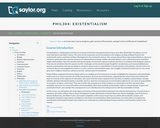
This course will examine the main focus that unites existentialists, "existence." Particularly, it will examine the concrete existence of individual human beings. Major figures or study will be, Blaise Pascal, Sóren Kierkegaard, Fyodor Dostoevsky, Friedrich Nietzsche, Martin Heidegger, Jean-Paul Sartre, Simone de Beauvoir, and Albert Camus.

This course is a seminar on creativity in art, science, and technology. We discuss how these pursuits are jointly dependent on affective as well as cognitive elements in human nature. We study feeling and imagination in relation to principles of idealization, consummation, and the aesthetic values that give meaning to science and technology as well as literature and the other arts. Readings in philosophy, psychology, and literature are part of the course.
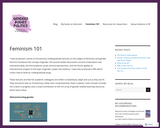
I have produced a series of introductory undergraduate lectures on the subject of feminism and gender: the first introduces the concept of gender, the second tackles discussions around universalism and intersectionality, the third explores issues around reproduction, and the fourth applies an intersectional analysis to the topic of gender, power and violence. I have also produced a fifth which covers how to write an undergraduate essay.
The lectures take the form of Prezi presentations. They are free for academic colleagues and others to download, adapt and use as they see fit. They can be simply read out in class, expanding on points where appropriate, used as the basis for a more in-depth lectures by colleagues with expertise in the field, or clicked through and read by students in preparation for discussion sessions. The webpage includes links to transcripts of each lecture, for text readers.

Tome 3
Short Description:
Après le tome 1 paru en 2014 et le tome 2 en 2015, ce livre propose une nouvelle série de portraits de femmes qui ont contribué de manière significative au patrimoine scientifique de l’humanité dans toutes les sciences, incluant les sciences sociales et humaines, ou qui, œuvrant en science, en droit, en art ou en littérature, ont contribué au bien commun grâce à un engagement social, politique ou éthique remarquable.Faites connaissance avec Hildegard von Bingen, Émilie du Châtelet, Laura Maria Catarina, Irma LeVasseur, Melanie Klein, Françoise Héritier, Jane Goodall, Juanita Westmoreland-Traoré, Louise Arbour et plusieurs autres. Vingt-deux femmes médecins, philosophes, écrivaines, biologistes, anthropologues, psychanalystes, juristes, etc. de dix pays, à la vie inspirante, racontées avec enthousiasme par 18 autrices et auteurs de dix pays, dont des étudian-t-es de l’Université Laval.
Long Description:
Après le tome 1 paru en 2014 et le tome 2 en 2015, ce livre propose une nouvelle série de portraits de femmes qui ont contribué de manière significative au patrimoine scientifique de l’humanité dans toutes les sciences, incluant les sciences sociales et humaines, ou qui, œuvrant en science, en droit, en art ou en littérature, ont contribué au bien commun grâce à un engagement social, politique ou éthique remarquable.
Faites connaissance avec Hildegard von Bingen, Émilie du Châtelet, Laura Maria Catarina, Irma LeVasseur, Melanie Klein, Françoise Héritier, Jane Goodall, Juanita Westmoreland-Traoré, Louise Arbour et plusieurs autres. Vingt-deux femmes médecins, philosophes, écrivaines, biologistes, anthropologues, psychanalystes, juristes, etc. de dix pays, à la vie inspirante, racontées avec enthousiasme par 18 autrices et auteurs de dix pays, dont des étudiant-e-s de l’Université Laval.
Word Count: 45851
ISBN: 978-2-924661-63-5
(Note: This resource's metadata has been created automatically by reformatting and/or combining the information that the author initially provided as part of a bulk import process.)

This course examines problems in the philosophy of film as well as literature studied in relation to their making of myths. The readings and films that are discussed in this course draw upon classic myths of the western world. Emphasis is placed on meaning and technique as the basis of creative value in both media.

Filosofía arendtiana e Inteligencia artificial
Short Description:
Trae a la luz temas de vanguardia y que requieren urgente atención bajo la lupa filosófica, en una visión totalmente diferente de las dos posturas predominantes hasta el día de hoy en el estudio de lo político (izquierda y derecha) y busca dar soluciones nuevas a un contexto distinto. Se plantean nuevos esquemas de poder y se presta a una gran controversia pero también a un nutrido debate.
Long Description:
Se trata de un ejercicio filosófico pero también de gran utilidad epistemológica, pues fija una postura muy clara respecto al papel de la Filosofía en el estudio de lo político, así como, frente a la Teoría y la Ciencia Política. Rescata el valor de la Filosofía (no sólo mediante una afirmación, sino además mediante un ejercicio práctico), más que como “madre de todas las ciencias”, como fuente constante e indispensable de saber para nutrir, al menos a las ciencias políticas y sociales, específicamente las Relaciones Internacionales y nutrirse de éstas para consolidar categorías de pensamiento. De ese modo teje un puente interdisciplinario. Lo anterior hace que no sea necesario ser ni filósofo, ni arendtiano para interesarse en el tema, pero igualmente rescata algunas de las categorías de la alemana y les da un enfoque totalmente actual. Trae a la luz temas de vanguardia y que requieren urgente atención bajo la lupa filosófica, en una visión totalmente diferente de las dos posturas predominantes hasta el día de hoy en el estudio de lo político (izquierda y derecha) y busca dar soluciones nuevas a un contexto distinto. Aún si a partir de categorías arendtianas, se hacen afirmaciones totalmente innovadoras en filosofía política, se plantean nuevos esquemas de poder y se presta a una gran controversia pero también a un nutrido debate.
Word Count: 38796
(Note: This resource's metadata has been created automatically as part of a bulk import process by reformatting and/or combining the information that the author initially provided. As a result, there may be errors in formatting.)
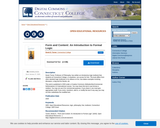
Derek Turner, Professor of Philosophy, has written an introductory logic textbook that students at Connecticut College, or anywhere, can access for free. The book differs from other standard logic textbooks in its reliance on fun, low-stakes examples involving dinosaurs, a dog and his friends, etc.
This work is published in 2020 under a Creative Commons AttributionNonCommercial-NoDerivatives 4.0 International License. You may share this text in any format or medium. You may not use it for commercial purposes. If you share it, you must give appropriate credit. If you remix, transform, add to, or modify the text in any way, you may not then redistribute the modified text.
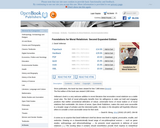
In this new edition of Foundations for Moral Relativism a distinguished moral philosopher tames a bugbear of current debate about cultural difference. J. David Velleman shows that different communities can indeed be subject to incompatible moralities, because their local mores are rationally binding. At the same time, he explains why the mores of different communities, even when incompatible, are still variations on the same moral themes. The book thus maps out a universe of many moral worlds without, as Velleman puts it, "moral black holes”. The six self-standing chapters discuss such diverse topics as online avatars and virtual worlds, lying in Russian and truth-telling in Quechua, the pleasure of solitude and the fear of absurdity. Accessibly written, this book presupposes no prior training in philosophy.
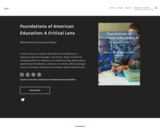
Short Description:
In this survey text, readers will explore the foundations of American education through a critical lens. Topics include the teaching profession, influences on student learning, philosophical and historical foundations, structures of schools, ethical and legal issues, curriculum, classroom environment, and the path forward.
Word Count: 76121
(Note: This resource's metadata has been created automatically by reformatting and/or combining the information that the author initially provided as part of a bulk import process.)

Short Description:
In this survey text, readers will explore the foundations of American education through a critical lens. Topics include the teaching profession, influences on student learning, philosophical and historical foundations, structures of schools, ethical and legal issues, curriculum, classroom environment, and the path forward.
Word Count: 76153
(Note: This resource's metadata has been created automatically by reformatting and/or combining the information that the author initially provided as part of a bulk import process.)

Advances in cognitive science have resolved, clarified, and sometimes complicated some of the great questions of Western philosophy: what is the structure of the world and how do we come to know it; does everyone represent the world the same way; what is the best way for us to act in the world. Specific topics include color, objects, number, categories, similarity, inductive inference, space, time, causality, reasoning, decision-making, morality and consciousness. Readings and discussion include a brief philosophical history of each topic and focus on advances in cognitive and developmental psychology, computation, neuroscience, and related fields. At least one subject in cognitive science, psychology, philosophy, linguistics, or artificial intelligence is required. An additional project is required for graduate credit.